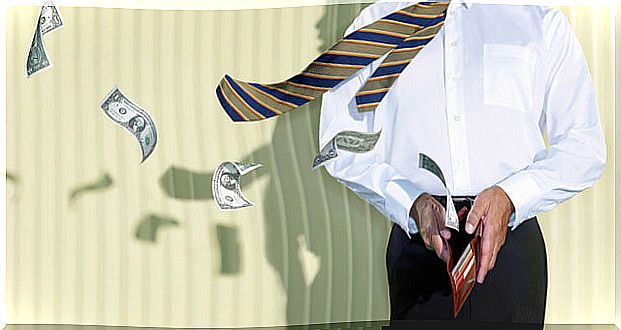When Emotions Lead You To Lose Money

Actions, such as making or losing money, are closely related to emotions. In most cases, this resource is not obtained or wasted for objective reasons. In this sense, we could say that money is a symbolic object; As such, it originates in our mind different ways of meaning and managing it, taking into account that it is a practically universal form of barter.
What leads us to make or lose money are the decisions we make. Beyond the eventual lack of resources, or their excess, what defines everything is the way in which we manage it. Money has acquired the status of a fetish, as we live in a world in which everything, little by little, has become an object of commerce.
Many people have been marked by a kind of combination between lack of money and emotional deficiencies. Perhaps their parents had to leave them alone to go to work, in order to get money to survive. It is also likely that at some point they were humiliated by lack of resources. In those cases, particularly, money becomes a complex problem that often leads to more and more problems.

Losing money and simulation
One of the factors that leads us to lose money is rejection or contempt for the life we lead. In the wrong way, the conviction is reached that it is the lack of economic resources that gives rise to this vital dissatisfaction.
According to Motterlini, M., & Somajni, C. (2008) there is a fantasy that personal worth would increase if we had more money. In fact, there is a strong tendency to link money with personal satisfaction. The person becomes unable to imagine pleasant situations that do not involve spending money. And since their resources are limited, dissatisfaction becomes a way of life.
Many times they “solve” the problem by trying to simulate a life without deficiencies. They feel a powerful attraction for all those objects that are status symbols. They end up losing money by spending it on unnecessary objects or businesses. Your goal is to experience “what it feels like to have a lot of money” and perceive yourself, even for a moment, as someone more whole.
Losing money as compensation
It is a similar situation to the previous one. The difference is that in this case the frustration leads to impulsive or compulsive behaviors. Under this category are those who literally cannot stand seeing a product on sale and not buying it. The accumulators of junk that are governed by the feeling that they have to buy more of it.
They are trying, unconsciously, to satisfy other, deeper needs. But since they have not realized it, theirs is a bottomless barrel. Your appetite for new products, or more money, is insatiable.
Supermarkets adore these types of consumers and help them lose money with little tricks. They are bombarded with advertising of non-existent sales (they raise the price artificially, and then pass the normal price as a great offer). They give them facilities to acquire everything. In the end, these buyers manage to pay the bills, but still feel empty. And the perverse cycle begins again.

The return of lack
There are many unconscious factors involved in money management. Nowadays, it appears more and more related to the concept of happiness through consumption. Also prevailing is the fantasy that the vile metal has the power to repair a cracked self-esteem. Or that allows us to give meaning to a reality that seems daunting to us.
Therefore, losing money is usually the consequence of having reserved a leading place for you. It is paradoxical, but the excessive desire to have money leads to losing money. The difference between the real value of this resource and the meaning given to it leads to erratic or unintelligent actions. In these cases, money, especially through consumption, is used as a means to solve difficulties of another order.
However, financial matters are the least indicated for emotions to come into play. And when it comes to confused and neurotic emotions, the danger is even greater. The problem is that those who are victims of these logics do not realize it. Therefore, losing money ends up becoming normal. Ultimately, this reaffirms dissatisfaction and makes deficiencies re-experienced in all their rawness.
The word yes is “would increase.” What is said there is precisely that money is not the problem, but that unsatisfied desire that increases and increases because it does not finish filling that void. And that money is just a smokescreen.
The Relationship Between Emotions and Losing Money: Final Thoughts
In the end, winning and losing money may just be a smokescreen. Perhaps the money in the background is not the problem, but that unsatisfied desire that increases and does not finish filling that void. It would be this void that precisely keeps desire unsatisfied. Thus, money would contribute, eventually, to cover up difficulties and suffering that they do not know or want to face.








